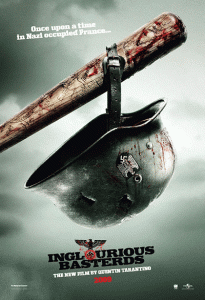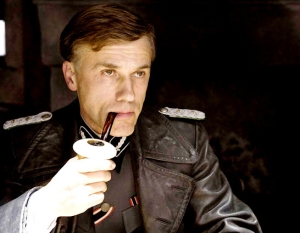
Inglourious Basterds. If you didn't like it, well, go watch Transformers or something.
So I saw Inglourious Basterds over the weekend. The quick review: it was awesome.
Seriously, don’t listen to the haters who slam on Quentin Tarantino just because it’s the cool thing to do. Don’t listen to the butt-hurt sci-fi nerds who think District 9 is the greatest movie ever made, and since Basterds dethroned it as box office champion, it must be inherently flawed (on a related note, I thought District 9 was decent, but flawed, especially in the way it abruptly ditched the documentary style two-thirds of the way through the film in favour of generic sci-fi nonsense).
Indeed, despite the mixed review from the professional critics, Basterds is the real deal, and definitely up there with Tarantino’s best. Of course, what exactly constitutes Tarantino’s best is a gargantuan topic all by itself … with the exception of Death Proof (which I’ve only seen once when it first came out), I like all of his films for a variety of different reasons — Jackie Brown has great performances, Kill Bill is just fun plain fun to watch, etc. To pick just one and declare it head and shoulders above the rest is no easy task.
But enough about Tarantino’s previous exploits — this review is all about his latest work, Inglourious Basterds. Well, it’s not really a review so much as it is a random series of thoughts pertaining to Basterds. No in-depth analysis here, kids — after all, I’ve only seen the movie once while in a packed theatre — just a few simple observations from the film.
(WARNING: HERE THERE BE SPOILERS!)
- Brad Pitt was awesome. Sure, it wasn’t the greatest “acting”, per se — in fact, it was campy and hammy as all hell — but every time he was on screen you were sure to be entertained (especially the scene in the theatre where he absolutely butchers the Italian language).

Rumour has it that he wants his scalps.
- For the people complaining that it was “all talk and no action”, well, it’s a Tarantino flick — what the hell were you expecting? Okay, so the final act of Kill Bill Vol. 1 is an exception to the rule, but for the most part, Basterds follows the Tarantino model to perfection.
Is there a lot of dialogue in Basterds? Sure, but if anything its dialogue serves a much greater narrative purpose than those of Reservoir Dogs or Pulp Fiction. While those films featured bloated pop culture references that ultimately humanized the thugs and thieves — hey, Jules and Vincent are chatting about burgers, they seem like likable dudes — the conversations in Basterds creates palpable tension and a sense of dread that has you fearing for the characters’ safety, as the dialogue is usually just a cover for the subtext of hiding / uncovering true identities in life-or-death, make-or-break situations (Col. Landa in the farmhouse, the Gestapo officer in the pub’s basement, etc.).
- Hitler finally gets what’s coming to him. Yes, I can understand why some people might be upset about Tarantino’s “alternate ending” to World War II, especially those who say it disrespects the actual soldiers that sacrificed so much marching into Berlin to end the war. But hey, this was never advertised as an historical re-enactment — it’s a work of fiction that just happens to be set in Nazi-occupied France and uses some “stock characters” from that time period (Hitler, Goebbels, etc.). It’s an alternate reality, an alluring “What If?” scenario — nothing more, nothing less.

You gonna die.
And besides, since when is killing Hitler a bad thing? In real life, he never really got his comeuppance. Sure, the Nazis lost the war, but nobody actually got the chance to shoot Hitler down, riddle his corpse with bullets, then blow up the corpse in a fiery inferno. The history books say that it didn’t go down in that manner, but we all wish it did. Although they do say that the winner writes the history books … so why not have a Jewish hit squad take down the Fuhrer? Hitler deserved to die, anyway, if only for that wheezy, inhaling laugh of his. What an annoying jerk!
- Nice to see that Mike Myers still exists and that he didn’t hang himself after the failure of The Love Guru. Sure, he was basically playing an elderly Austin Powers, but still, maybe some of that Tarantino magic will rub off on him and he’ll get his career back on track.
- Even if they despised the movie, all of the critics agreed that the acting of Christoph Waltz as Col. Hans Landa absolutely stole the show. And I definitely concur, Landa was a superb villain. Of course, the question remains — when he served Shoshanna that glass of milk in the restaurant, did he know who she was? The logical answer is that he couldn’t possibly know, having never even seen her face before, and that it was all a coincidence carefully constructed to make the audience worry for Shoshanna’s safety. But you know … Landa did have the same menacing look in his eyes as when he was interrogating the French farmer and revealed that he knew all along that Shoshanna’s family was hiding under the floorboards …

Col. Hans Landa was a deliciously evil villain.
- If there was on area that Basterds fell short, it was with the soundtrack — it just wasn’t as memorable or catchy as the music found in Pulp Fiction or Kill Bill. Perhaps a better appreciation of the soundtrack would come with multiple viewings, but at first glance nothing really stood out like Miserlou or Battle Without Honor or Humanity.
…
All in all, Inglourious Basterds is undoubtedly one of my favourite movies of the year and I definitely recommend checking it out. Due to its 1940s setting there is a distinct lack of pretentious pop culture references, which should make the movie more palatable to even the harshest of Tarantino’s critics.
RATING: SUPER FANTASTIC COOL
Filed under: Movie Reviews | Tagged: Adolf Hitler, Brad Pitt, Christoph Waltz, Death Proof, District 9, Inglourious Basterds, Jackie Brown, Kill Bill, Mike Myers, Pulp Fiction, Quentin Tarantino, Reservoir Dogs, World War II | Leave a comment »






